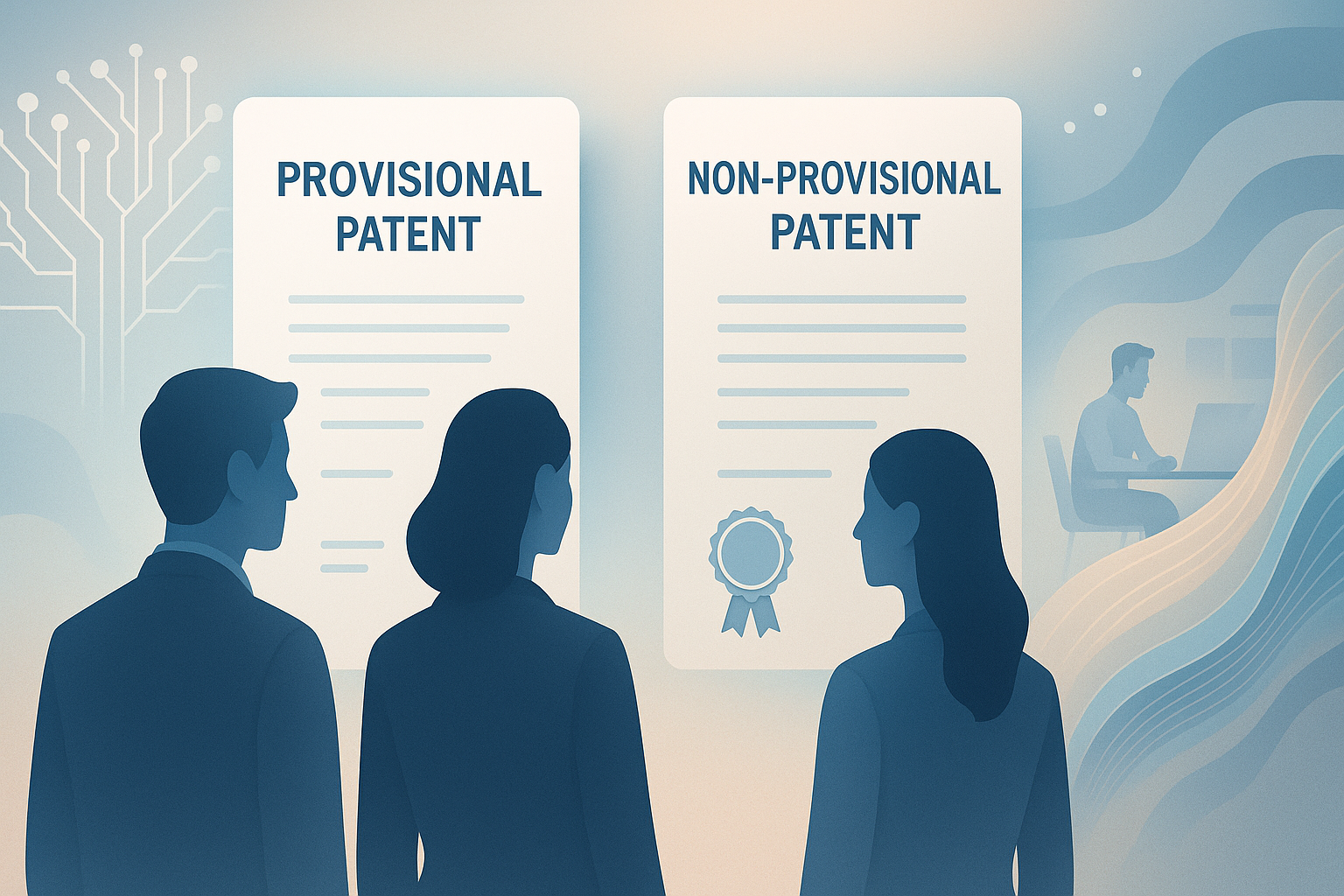
Provisional vs Non-Provisional Patents

Provisional vs Non-Provisional Patents

Introduction
Navigating the world of patents can be complex for startup founders. Understanding the distinction between provisional and non-provisional patents is crucial for protecting your intellectual property (IP) and ensuring that your innovations are secure. This post will explore both types of patents, their advantages, disadvantages, and when to consider each option.
What is a Provisional Patent?
A provisional patent is a temporary patent application that establishes an early filing date for an invention but does not lead to an issued patent. Here are the key features:
- Duration: A provisional patent lasts for 12 months. During this period, you must file a non-provisional patent to benefit from the early filing date.
- Cost-Effective: Filing a provisional patent is generally less expensive than a non-provisional patent. It requires fewer formalities and can be a strategic step for startups with limited budgets.
- No Examination: Provisional patents are not examined by the patent office. This means that they do not guarantee that a patent will be granted; they simply secure your place in line.
- Flexibility: Founders can refine their inventions and assess market viability while retaining the option to file a full patent later.
Advantages of Provisional Patents
- Early Filing Date: Secures your invention date, which can be critical in fast-moving industries.
- Cost Savings: Allows founders to save on immediate patent costs while working on the invention.
- Simplicity: Fewer requirements make the process more straightforward than non-provisional applications.
- Marketing Tool: Demonstrating that you have filed for a provisional patent can enhance credibility when seeking investment.
Disadvantages of Provisional Patents
- Limited Duration: You only have 12 months to convert to a non-provisional patent; otherwise, the filing will expire.
- No Legal Rights: A provisional patent does not confer the ability to enforce rights against others who may infringe upon it.
What is a Non-Provisional Patent?
A non-provisional patent is a formal application that, if granted, provides full legal protection for an invention. Here are its main characteristics:
- Examination Process: Non-provisional patents undergo a rigorous examination by the patent office, which assesses the patentability based on criteria such as novelty, non-obviousness, and utility.
- Duration: If granted, a non-provisional patent typically lasts for 20 years from the filing date, offering extended protection.
- Legal Enforceability: Grants the patent holder the right to exclude others from making, using, or selling the invention without permission.
Advantages of Non-Provisional Patents
- Strong Protection: Provides robust intellectual property rights and legal standing.
- Long-Term Security: Ensures protection for up to 20 years, allowing founders to capitalize on their inventions.
- Potential Licensing Opportunities: Can lead to licensing agreements as a valuable business asset.
Disadvantages of Non-Provisional Patents
- Costly and Complex: The filing, prosecution, and maintenance costs can be significant. Additionally, the application process is complex and may require professional assistance.
- Time-Consuming: It may take several years to receive initial approval, which can delay commercialization.
When to Choose Each Option
- Provisional Patents: Ideal for founders who are in the early stages of development and need time to refine their inventions or seek funding. It’s a strategic choice for startups looking to gauge interest in their ideas without incurring hefty costs initially.
- Non-Provisional Patents: Best suited for founders who are confident in their innovations, ready for commercialization, or seeking to establish stronger market positions. Filing for a non-provisional patent is recommended when you are prepared to fully disclose the invention, commit to its development, and defend your IP rights.
Conclusion
In summary, both provisional and non-provisional patents serve critical functions in protecting intellectual property. Understanding when and how to utilize these patents is essential for startup founders looking to safeguard their innovations effectively. Provisional patents can provide a stepping stone, while non-provisional patents offer long-term protection and enforceable rights.
By thoughtfully considering your strategy around patenting, you can position your startup for success in the competitive landscape of innovation.